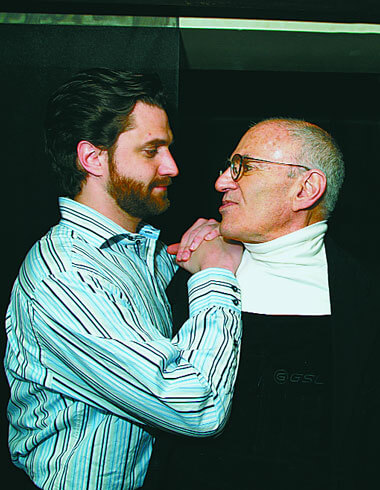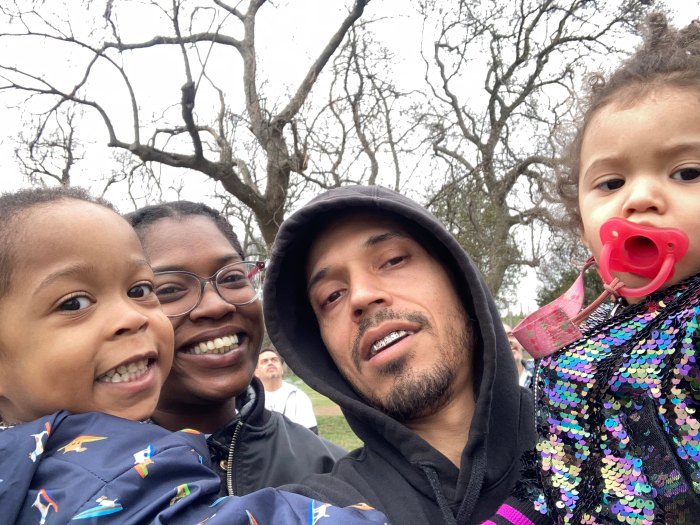Larry Kramer talks about “The Normal Heart” Two Decades Later
If you don’t know who Larry Kramer is, put down this paper and pick up the New York Press. You’re not a faggot.
If you’re still here, you hardly need his particulars, you need the box office number for the Public Theater, where his 19-year-old AIDS play “The Normal Heart” has returned to smack patrons upside the head like a boomerang.
Kramer’s stunning grace note is still poignant and unafraid, slogging his body double Ned and lover Felix through the viscera of smashed potato chips, broccoli, and all that spilled milk—the miasma years of AIDS—and marching them up the wedding aisle like salmon swimming upstream.
“The Normal Heart” is mandatory.
Mr. Kramer made time to chat on opening night day just back from a walk with his beloved Wheaton Terrier.
TONY PHILLIPS: I read this play when I was coming out. It’s one of those seminal texts, but I’d never seen it produced. Are you thumbing your nose at everyone who said this production would be dated and irrelevant?
LARRY KRAMER: Well, it went through a period where it was a little dated. I remember reading it and thinking that, but now it’s taken on a whole new aspect. I realized that when I heard these actors read it for the first time. When we first did it, you walked in and it was all about anger. You said, “Who are these kids going nuts?” And now when you walk in and you know what’s happened… this is the beginning. It’s much more a tragedy. I gotta tell you, I was, and continue to be, a wreck from the rehearsals.
TP: It must be hard for you to watch. Especially that scene where Bruce reads the letter essentially firing Ned from Gay Men’s Health Crisis, an organization he—you, really helped create.
LK: That letter is the actual, word-for-word letter I received from Nathan Fain, every word of it. It’s a long letter and I decided to use it all.
TP: That’s what I love about you, you’re not afraid to name names and implicate the fuckers. What do you think of Raul Esparza? He’s having such a major season with “Taboo” and now this.
LK: I call him a force of nature.
TP: Did you see “Taboo”?
LK: I did and I adored it.
TP: One smacked-up queen and another who cruises toilets for sex. I wouldn’t think that’s exactly your cup of tea.
LK: I lived in London for ten years when the club scene was just beginning and it reminded me a lot of that.
TP: What do you make of this impression that I have based on your play that you might be a little prudish?
LK: Why does it equal prudery?
TP: You say casual sex is junk food.
LK: But Ned doesn’t say that! The doctor does. All the things I got accused of were usually things the doctor said. She’s the one saying stop having sex. I say that’s a preposterous thing.
TP: But your character clearly says, “Soon we’re going to be blamed for not doing anything to help ourselves.” When I heard that line I thought, who could be that prescient? Did you really see this all coming?
LK: I don’t think I saw anything that wasn’t there to be seen by everybody and it always amazed me that people call me prescient. It just seemed obvious to me. It just kept escalating. It starts with a few cases of syphilis and gonorrhea. The next thing you know, you’ve got hepatitis and all the time you have amoebas. God, I had amoebas so many times, and then hepatitis B. This was the next step. Why didn’t everyone else see it? Whenever people say thank you, I always say it was all there for you to see too. Fuck you! Why didn’t you get up there and fight?
TP: Tell me about your director.
LK: David is just incredible. He was the replacement director. The original director was fired.
TP: Uh, oh. Who fired him?
LK: He fired himself [laughs]. The play is put on by The Worth Street Theater Company. One of their three directors is a guy called Jeff Cohen. It was a bad marriage between him and the cast.
TP: Well, heads on a platter, this cast can have whatever they want. Joanna Gleason as Dr. Emma Brookner. So major. I’ve been a fan since “Boogie Nights.”
LK: I made her part bigger, in the script it’s not all that big a part. It’s just very dramatic and she’s got that big tirade in the second act. She just happened to be in New York from L.A. and stopped by to see our casting director, Stuart Howard. She said she was desperate to come back and do a play. So he said I have just the play for you. She fell for it. She said I’m so ready to do something like this because it really was an extension of herself. She’s wonderful, and oh, she’s so smart. She taught me so much about acting.
TP: I saw your play with John Fleck, one of the NEA Four, and Joanna’s “You are all idiots” speech to the NIH, made me realize whether it’s the NIH or the NEA, it’s all the same bureaucracy.
LK: Every kind of bureaucratic echelon is a mess, people don’t work well in groups. It’s not a place that allows for individuality to take over.
TP: Did you do a lot of tinkering? I heard Tony Kushner forbade you to change the play.
LK: He’s coming tonight. I didn’t change it really, but because I wanted to give more to Joanna, I took a scene we had done in London—that scene where she gets up and walks—it had not worked there because we didn’t know how to handle the braces, but then I finally understood and it became a great scene.
TP: It speaks to the sexual undercurrent between Ned and Dr. Emma.
LK: Yes, but also how, for all her yelling, she’s just as helpless. It’s very character-building for her. The other changes concern letting the cast read one of the many, many screenplays I wrote for Barbara Streisand. They all read it and every single one of them scavenged a couple lines. In most cases I agreed to it so the play is now 67 minutes longer I’m afraid.
TP: Are you still shopping it? Would you like to see it as a film?
LK: I just sit and wait. [Streisand’s] called again. She wants it back again. Her people are actually coming tonight, but she’s too old to play Emma now.
TP: You must take a certain pleasure in saying that.
LK: If she had made it 1986 when she acquired the rights… I sat by while she made one after another. Four movies, only one of which was partially good, “Prince of Tides,” and when she made “The Mirror Has Two Faces” I read the script and said, “Barbara, how can you make this piece of shit”—and I did, those were exactly my words—“when you could have made ‘The Normal Heart’?” That’s when I demanded the rights back.
TP: And what about your book?
LK: I’ve had to put it aside for a couple of months, but I’m ready to go back to it, I hope tomorrow. It’s very long, close to 3,000 pages, probably more. But my editor loves it and doesn’t think it should be cut at all. He doesn’t mind if it gets any longer. That’s fine by me because I don’t’ want to cut it. He’s the only one who’s read the whole thing.
TP: I want to know if Ibsen and Auden—there’s that wonderful Auden poem in Playbill—are influences.
LK: I don’t know that Auden was an influence. I just remembered the poem. I’m influenced by the stylists more than anything else. “Faggots” was influenced by Evelyn Waugh. I’ve passed beyond the stage where anything influences me.
tp: Well then what about younger playwrights? Whom do you influence? I imagine David Drake is someone you’d champion.
LK: [Laughs] I don’t go to the theater very much so I’m not aware of what’s really happening.
TP: Did you see David’s play?
LK: “The Night Larry Kramer Kissed Me?”
TP: Yeah.
LK: That’s a hundred years ago. I saw a very early version when it was still at Dixon place. Then, when he expanded it, I was told that he killed me off at the end. I was in a fragile state then, so I didn’t want to see that.
TP: His title speaks to a really interesting phenomenon in that Ned is almost reviled by the gay community…LK: Not almost.
TP: Exactly, but here you are, a hero to so many people.
LK: Thank you. The other night at the theater I was sitting in the back and the actors wouldn’t come out for another bow so everyone turned on me. I got this ovation and, you know, I ran out of the theater screaming. I’m not very good at all that. I don’t believe a word of it. I’ve been out and I’ve been in. Yes, in is better, but I expect to be out any moment again.
TP: How do you feel about what else is happening in town? I notice a lot of parallels being drawn between the early response, or lack thereof, to the AIDS pandemic and what we’re now doing, or not doing, about crystal meth.
LK: I just can’t believe it. I find it so disheartening. People who should know better are getting infected and it breaks my heart because so many people obviously died in vain. I’m surprised, but I can’t say I’m surprised because nothing ever really changes. There’s another generation out there.
TP: What about gay marriage? Your play can be read as a mandate to normalize gay male sexuality, which is front page news these days. It’s like what you wrote has come to pass.
LK: It’s not the first time [laughs]. The fact that there’s a marriage at the end of the play is wonderful. I got a lot of shit for that the first time around, that it was corny and melodramatic. The other was I put the doctor in a wheelchair, as if I had made that up. Everyone thought it was supposed to be Dr. Krim and not Dr. Laubenstein who in fact was in a wheelchair. Everything plays true—people don’t realize that.
TP: It’s good to hear you’re bouncing back from the [liver] transplant. Everything else is good?
LK: My health is excellent. Everything’s fine.
TP: You attribute at least some of that to turquoise, no?
LK: Well, I started wearing the turquoise in 1958 when I came down from Yale. I went to a fortune teller and she said always wear turquoise, it will look after you. So I started wearing it. The sicker I got, the more I loaded myself with it. And then when I was really sick, I looked like a freak. I’m still a little freaky, but I’m cutting back. But you know, here I am.
TP: Larry, this play resonates in a way that makes you want to do something. Especially around those scenes where GMHC was forming, just a bunch of phones on top of cardboard moving boxes. I don’t see the kind of energy that galvanized GMHC and ACT UP anymore.
LK: I agree. I don’t see gay New York in any kind of visibility. I don’t see groups of people speaking out or doing things.
TP: What are those things? Do you have any concrete suggestions?
LK: Whatever you want to do. Both these organizations grew by giving people a place to say I want to do this or I can do that. GMHC was founded on very slender parameters: “Spread information and fight.” What does that mean? Roger [McFarlane] came in and set up patient care and crisis counseling. People would come and say, “I’m a doctor, what can I do? I’m a lawyer, what can I do?” Because GMHC became so structured, ACT UP did just the reverse. It was going to be a “democratic” organization and people could do whatever they wanted within an almost too-democratic framework. It worked for four or five years and then the smart guys left and the crazies took over. It’s as simple as that. If the smart guys had stayed—the guys who went off and formed [Treatment Action Group]—I suspect ACT UP would still be a very powerful and valuable organization.


































